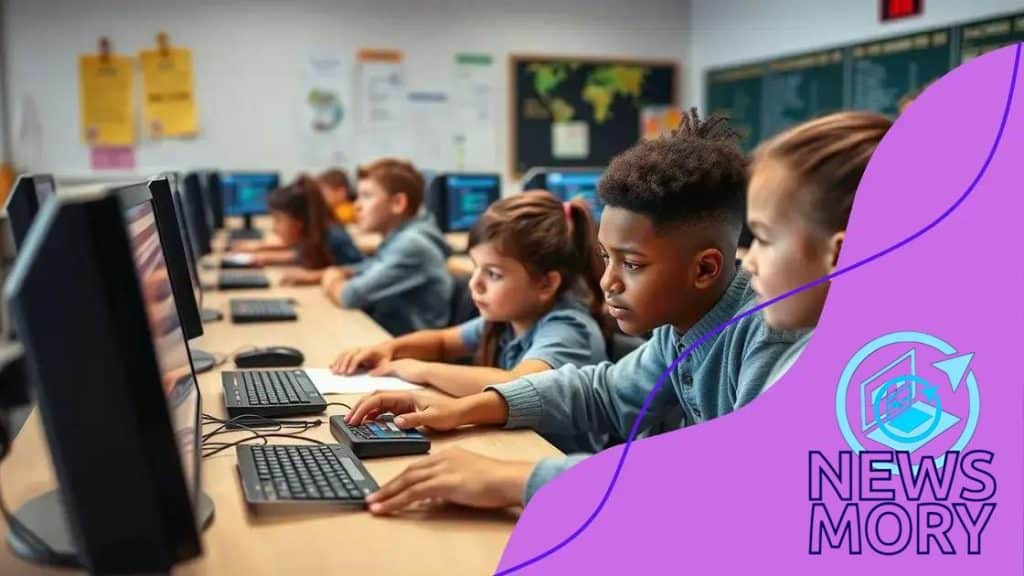How coding education is preparing students for future careers

Anúncios
Coding education equips students with essential skills for future careers, enhancing problem-solving abilities and providing access to diverse job opportunities in technology, data science, and more.
How coding education is preparing students for future careers is an evolving topic. As technology permeates every sector, understanding coding can open doors to myriad opportunities. Have you ever wondered how learning to code could change a student’s future?
Anúncios
The importance of coding skills in today’s job market
In today’s fast-changing job market, coding skills are increasingly vital. Understanding coding can give students a major advantage as they enter various career fields. As technology continues to grow, many employers look for candidates who can adapt and use programming languages.
Why Coding Skills Matter
Learning to code is not just about writing software. It helps individuals develop critical thinking and creative problem-solving abilities. Students who engage in coding learn to approach challenges with a structured mindset. This approach is beneficial across many jobs today.
Benefits of Coding in Various Careers
Many industries now require basic knowledge of coding. For example:
Anúncios
- In healthcare, coding can improve data management and patient care.
- Finance professionals use coding to analyze market trends.
- Marketing teams leverage coding for data analytics and better customer targeting.
This trend underscores the broader relevance of coding. Moreover, coding education encourages collaboration and teamwork, essential skills in modern work environments.
Employers appreciate candidates who display flexibility and the ability to learn new technologies. Coding fosters these traits, making aspiring professionals more attractive in the job market. Furthermore, it opens doors to specialized roles like software development, data science, and web design.
As students gain experience in coding during their education, they build confidence. This confidence can lead them to pursue innovative projects and entrepreneurial opportunities, further enhancing their career prospects.
In summary, coding skills play a crucial role in equipping students for the jobs of the future. They not only enhance individual careers but also contribute to the overall growth of various industries.
How coding education fosters problem-solving abilities
Coding education plays a vital role in developing strong problem-solving abilities. When students learn to code, they often face challenges that require them to think critically. These challenges help students to develop a systematic approach to problem-solving that is useful in many areas of life.
Developing Analytical Skills
By engaging with coding tasks, students enhance their analytical skills. Analyzing how a program operates and identifying issues within the code requires a sharp mind. This process mirrors real-world problem-solving, where one must assess situations and determine the best course of action.
Hands-On Learning through Challenges
Coding education often involves hands-on projects that present difficulties. When students tackle these projects, they learn to:
- Break down large problems into smaller, manageable tasks.
- Experiment with different solutions to find the best one.
- Debug code to discover what went wrong.
This method teaches resilience and tenacity. Students learn that making mistakes is part of the learning process, encouraging them to persist in seeking solutions.
Furthermore, coding education promotes collaboration. Working on group projects allows students to share ideas and techniques. They can see how different approaches to coding problems can lead to various solutions. This aspect of learning helps cultivate a community of critical thinkers.
The skills gained from coding education extend beyond programming. They influence how students tackle everyday challenges, whether it’s planning a project or managing time effectively. Overall, the problem-solving abilities developed through coding education prepare students for the complexities of modern life.
Exploring varied career paths through coding

Coding opens up a world of opportunities in various career paths. As technology advances, industries are increasingly seeking individuals with coding skills. By understanding how to code, students can explore exciting fields that were once thought to be out of reach.
Career Options Available
When students learn coding, they can choose from numerous professions. Some popular career paths include:
- Software Development: Creating applications and systems software that improve user experiences.
- Data Science: Analyzing large sets of data to uncover insights and support decision-making.
- Web Development: Building and maintaining websites, ensuring they are user-friendly and effective.
- Game Development: Design and creation of video games across platforms.
Each of these fields requires a unique set of skills and encourages creativity. For instance, software developers often work in teams to build applications. Understanding coding helps them communicate effectively with others.
The Role of Coding in Emerging Fields
Emerging technologies are creating even more diverse job opportunities. Fields like artificial intelligence and cybersecurity demonstrate how coding can lead to innovative roles. In AI, for instance, professionals might work on machine learning algorithms, shaping the future of technology.
Moreover, as businesses embrace digital transformation, knowing how to code becomes essential. For example, marketing professionals increasingly use data analysis tools to enhance customer engagement. By understanding coding, they can leverage these tools more effectively.
Coding education is empowering students to think beyond traditional jobs. With a foundation in programming, they can navigate and adapt to various roles that arise in a technology-driven world. This flexibility is beneficial as industries evolve.
Innovative teaching methods in coding education
Innovative teaching methods in coding education are transforming how students learn programming skills. These methods are designed to make learning engaging and effective. By using modern techniques, educators can foster a deeper understanding of coding concepts.
Project-Based Learning
One effective approach is project-based learning. In this method, students work on real-world projects that require them to apply their coding skills. This hands-on experience allows them to see the impact of their work. For instance, they might create a website, develop an app, or automate a process.
Gamification in Learning
Another innovative method is gamification. By incorporating game elements into lessons, educators can increase student motivation. Gamification can involve challenges, rewards, and levels of achievement. This approach makes learning fun and keeps students engaged. For example:
- Students earn points for completing coding tasks.
- They can compete with classmates in coding competitions.
- Badges are awarded for mastering certain skills.
This approach builds enthusiasm and a spirit of friendly competition among learners.
Flipped classrooms are also gaining popularity in coding education. In this model, students learn new content at home through videos and online resources. Then, they come to class prepared to work on projects and ask questions. This method enhances collaboration and allows instructors to provide more focused assistance when needed.
Collaboration tools are vital in modern coding classes, too. Platforms like GitHub allow students to work together on coding projects from different locations. These tools teach students how to collaborate in the real world, mirroring the teamwork they will encounter in their careers.
Real-world applications of coding skills
Coding skills have numerous real-world applications that extend far beyond classroom walls. As technology evolves, individuals equipped with coding knowledge can tackle problems across various industries. Whether it’s creating software, analyzing data, or automating processes, coding plays a crucial role.
Software Development
One of the most visible applications of coding is in software development. Coders create applications that people use daily, from mobile apps to business software. Understanding programming languages like Java, Python, or JavaScript allows developers to design solutions that meet specific needs.
Data Analysis
Data is everywhere, and organizations rely on coding skills to interpret it effectively. Data analysts use coding languages such as R or SQL to extract insights from large data sets. This analysis helps businesses make informed decisions. The ability to visualize data using coding enhances its accessibility to non-technical stakeholders.
Web Development
Coding is also essential in building and maintaining websites. Web developers use HTML, CSS, and JavaScript to create interactive and user-friendly web experiences. As e-commerce grows, businesses increasingly seek web developers who can implement features that improve customer engagement.
Moreover, coding skills empower automation. By writing scripts or programs, individuals can automate repetitive tasks, saving time and reducing human error. For instance, businesses often automate data entry processes, allowing staff to focus on more strategic activities.
Coding skills enhance creativity as well. Individuals can develop their projects, from personal blogs to innovative solutions for societal challenges. Many non-profits leverage coding to build platforms that elevate their causes and reach broader audiences.
In summary, coding education is essential for preparing students for future careers. By learning coding, students not only gain technical skills but also enhance their problem-solving abilities. The various applications of coding in real-world scenarios demonstrate its importance. Innovative teaching methods keep students engaged and foster creativity. Overall, embracing coding education equips students for success in an increasingly digital world.
FAQ – Frequently Asked Questions about Coding Education
How can coding skills benefit my career?
Coding skills can open up many job opportunities in technology, data analysis, web development, and software engineering, making you a valuable candidate.
What are some innovative teaching methods used in coding education?
Methods like project-based learning, gamification, and flipped classrooms are commonly used to engage students and make learning more effective.
Why is problem-solving important in coding?
Problem-solving is crucial in coding because it helps students learn to analyze issues, think critically, and develop solutions, which are essential skills in any career.
What real-world applications are there for coding skills?
Coding skills are applied in software development, data analysis, web development, and many other fields, driving innovation and efficiency.





